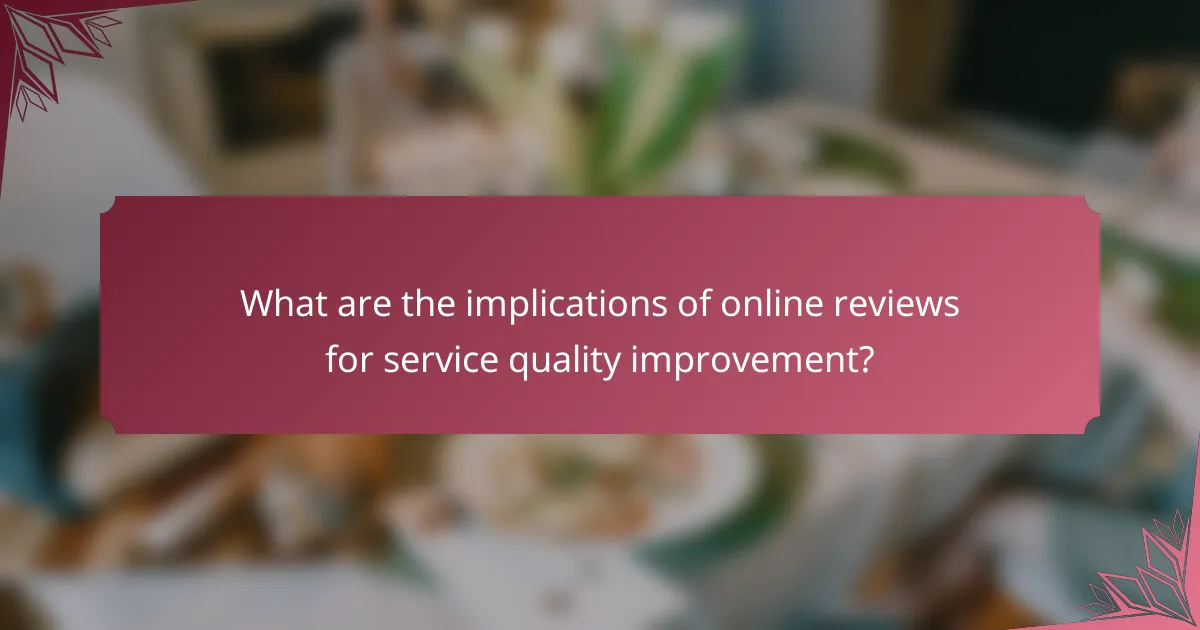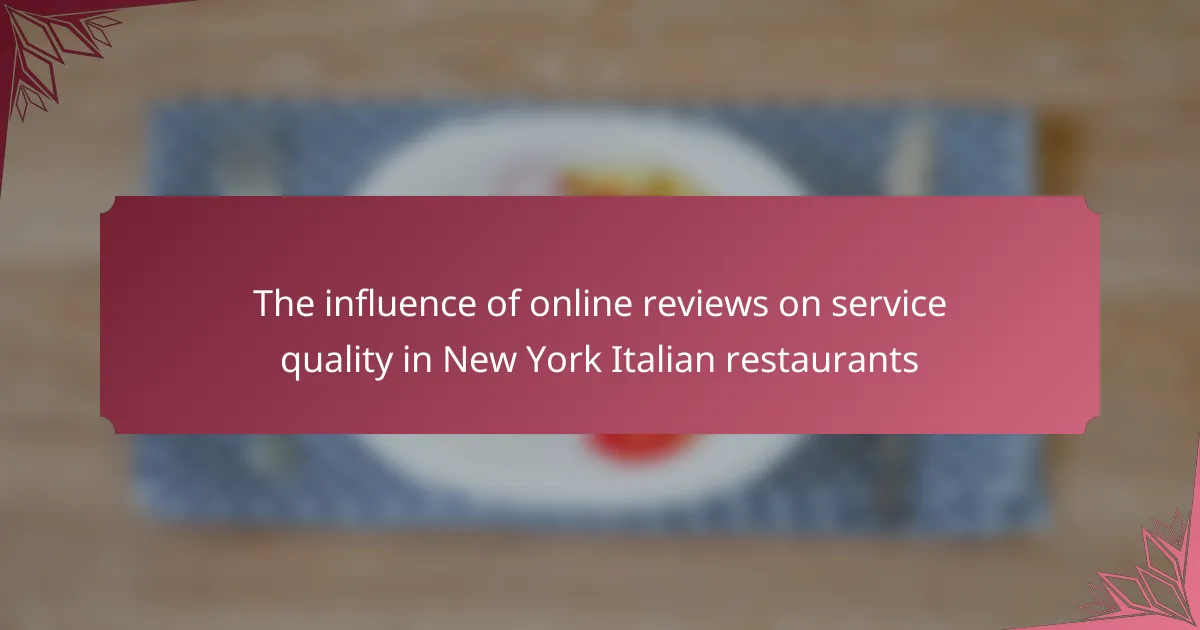Online reviews are a critical factor influencing service quality in New York Italian restaurants. Positive reviews enhance customer trust and can lead to a significant increase in revenue, while negative reviews can damage reputation and reduce patronage. Research highlights that customer feedback through platforms like Yelp and Google directly impacts dining decisions and prompts restaurants to adjust their services accordingly. Effective engagement with customers, including timely responses to reviews, not only addresses concerns but also fosters loyalty and improves perceptions of service quality. This article examines the substantial role online reviews play in shaping the dining experience and operational strategies of Italian restaurants in New York.

What is the influence of online reviews on service quality in New York Italian restaurants?
Online reviews significantly influence service quality in New York Italian restaurants. Positive reviews often lead to increased customer trust and higher patronage. A study by the Journal of Hospitality and Tourism Research found that a one-star increase in Yelp ratings can lead to a 5-9% increase in revenue for restaurants. Conversely, negative reviews can decrease customer visits and harm the restaurant’s reputation. Customers frequently rely on online reviews to make dining decisions. The visibility of these reviews on platforms like Yelp and Google affects how restaurants perceive their service quality. Restaurants often adjust their service based on feedback to improve ratings. Thus, online reviews play a critical role in shaping service quality in this dining sector.
How do online reviews impact customer perceptions of service quality?
Online reviews significantly influence customer perceptions of service quality. Positive reviews enhance customers’ expectations and trust in a service. Customers often rely on the experiences shared by others when making decisions. High ratings can lead to increased patronage and repeat visits. Conversely, negative reviews can deter potential customers. Research shows that 84% of people trust online reviews as much as personal recommendations. In the context of New York Italian restaurants, a restaurant’s overall rating can directly affect its reputation and customer traffic. Thus, online reviews serve as a critical factor in shaping perceptions of service quality.
What role do star ratings play in shaping customer expectations?
Star ratings significantly influence customer expectations for services. They provide a quick, visual representation of quality. A higher star rating typically correlates with better perceived service quality. Customers often use these ratings to gauge reliability and satisfaction. Research shows that 70% of consumers trust online reviews as much as personal recommendations. This trust in ratings shapes their decision-making process. In the context of New York Italian restaurants, star ratings can directly impact customer footfall and revenue. Higher ratings often lead to increased patronage and customer loyalty.
How do specific review comments affect customer decisions?
Specific review comments significantly influence customer decisions. Positive comments enhance a restaurant’s appeal, increasing the likelihood of patronage. Conversely, negative comments deter potential customers, impacting overall sales. Research indicates that 84% of consumers trust online reviews as much as personal recommendations. Specific details in reviews, such as food quality and service speed, provide actionable insights for customers. Customers often look for patterns in reviews to gauge consistency. A single negative review can lead to a 22% decrease in customer likelihood to visit. Thus, specific review comments shape customer perceptions and choices effectively.
Why are online reviews significant for New York Italian restaurants?
Online reviews are significant for New York Italian restaurants because they directly influence customer decisions. Many diners rely on reviews to gauge the quality of food and service. In a competitive market, positive reviews can attract more customers. Conversely, negative reviews can deter potential patrons. Research shows that 84% of people trust online reviews as much as personal recommendations. Additionally, restaurants with higher ratings often see increased revenue. This highlights the importance of managing online reputation for sustained success.
What trends in customer behavior are influenced by online reviews?
Online reviews significantly influence customer behavior trends. Customers often rely on reviews to make purchasing decisions. A study found that 84% of people trust online reviews as much as personal recommendations. Positive reviews increase the likelihood of customers choosing a restaurant. Conversely, negative reviews can deter potential diners. Customers frequently check the overall rating before visiting a restaurant. They also tend to spend more at establishments with higher ratings. Additionally, reviews impact repeat visitation; satisfied customers are more likely to return. Overall, online reviews shape perceptions and expectations of service quality.
How do online reviews compare to traditional word-of-mouth recommendations?
Online reviews are often more accessible and widespread than traditional word-of-mouth recommendations. Online reviews can reach a larger audience instantly, while word-of-mouth is limited to personal interactions. According to a study by BrightLocal, 87% of consumers read online reviews for local businesses. This indicates a significant reliance on digital feedback compared to personal recommendations. Additionally, online reviews provide a permanent record that can be referenced repeatedly. In contrast, word-of-mouth is ephemeral and can vary by individual perception. Overall, online reviews tend to be more influential due to their broad reach and permanence.
What factors contribute to the effectiveness of online reviews?
The effectiveness of online reviews is influenced by several key factors. Credibility is crucial; reviews from verified customers tend to carry more weight. The detail within the review also impacts effectiveness; specific experiences provide valuable insights. Recency matters as well; recent reviews are often seen as more relevant. The overall rating can influence perceptions; higher ratings typically attract more attention. Emotional tone plays a role; positive language can enhance the appeal of a review. Response from businesses to reviews can also affect effectiveness; engagement shows customer care. According to a 2021 study by BrightLocal, 79% of consumers trust online reviews as much as personal recommendations.
How does the volume of reviews affect perceived service quality?
The volume of reviews significantly impacts perceived service quality. A higher number of reviews typically enhances credibility. Consumers often interpret numerous reviews as a sign of reliability. Studies indicate that businesses with more reviews are perceived to offer better service. For instance, research by Chevalier and Mayzlin found that increased review volume positively correlates with customer ratings. This suggests that volume influences consumer trust. Additionally, a large volume of reviews can create a perception of popularity, further enhancing perceived quality. Therefore, the volume of reviews plays a crucial role in shaping service quality perceptions in the restaurant industry.
What is the importance of review recency in influencing customer choices?
Review recency significantly impacts customer choices. Recent reviews provide updated insights into a restaurant’s current service quality. Customers often perceive more recent feedback as more relevant and trustworthy. A study by BrightLocal found that 85% of consumers read online reviews for local businesses, with 73% considering reviews written within the last month as most important. This highlights the importance of fresh information in decision-making. Outdated reviews may not accurately reflect the current dining experience. Therefore, restaurants with recent positive reviews are likely to attract more customers.

How do New York Italian restaurants respond to online reviews?
New York Italian restaurants typically respond to online reviews by acknowledging feedback and addressing concerns. They often express gratitude for positive reviews to reinforce customer satisfaction. For negative reviews, they usually apologize for any shortcomings and offer solutions or invite customers to discuss issues privately. This approach aims to demonstrate commitment to service quality and customer care. Research indicates that timely and personalized responses can enhance customer loyalty and improve overall perceptions of the restaurant. According to a study by the Harvard Business Review, restaurants that engage with reviewers see an increase in customer retention rates.
What strategies do restaurants implement to manage their online reputation?
Restaurants implement several strategies to manage their online reputation. They actively monitor online reviews and social media mentions. This allows them to respond promptly to customer feedback. Engaging with customers shows that they value opinions. They also encourage satisfied customers to leave positive reviews. This can improve their overall rating on review platforms. Additionally, restaurants may invest in reputation management software. Such tools help track and analyze online sentiment. Training staff to handle negative feedback effectively is also crucial. This helps maintain a positive image and improves service quality.
How do restaurants leverage positive reviews to enhance their brand image?
Restaurants leverage positive reviews to enhance their brand image by showcasing customer satisfaction. They prominently display positive feedback on their websites and social media pages. This strategy builds credibility and attracts potential customers. Positive reviews can influence consumer decisions, with 79% of consumers trusting online reviews as much as personal recommendations. Restaurants often respond to positive reviews, fostering engagement and community. Additionally, they may use positive testimonials in marketing materials. This approach creates a perception of quality and reliability. Overall, leveraging positive reviews effectively strengthens a restaurant’s brand image.
What steps do restaurants take to address negative feedback?
Restaurants take several steps to address negative feedback effectively. First, they monitor online reviews regularly. This helps them identify issues quickly. Next, they respond promptly to the feedback. A timely response shows customers that their opinions matter. Restaurants often apologize for any shortcomings. This acknowledgment can help rebuild trust. They may offer solutions, such as refunds or discounts. This can encourage dissatisfied customers to return. Additionally, restaurants analyze the feedback for trends. Understanding common complaints allows them to make necessary improvements. Implementing changes based on feedback enhances overall service quality. Studies show that addressing negative feedback can lead to increased customer loyalty.
How can restaurant owners effectively engage with online reviewers?
Restaurant owners can effectively engage with online reviewers by responding promptly and professionally. Timely responses show that the owner values customer feedback. Acknowledging both positive and negative reviews fosters a sense of community. Personalizing responses can enhance customer loyalty. For example, addressing reviewers by name can make interactions feel more genuine. Offering solutions to complaints demonstrates commitment to service improvement. Encouraging reviewers to return can be beneficial, such as providing incentives for repeat visits. Engaging with reviewers can also improve the restaurant’s online reputation, which is crucial in a competitive market like New York. Studies indicate that restaurants with active engagement see higher customer satisfaction ratings.
What are best practices for responding to customer reviews?
Best practices for responding to customer reviews include acknowledging the reviewer’s feedback promptly. Businesses should express gratitude for positive reviews. This reinforces customer loyalty and encourages future engagement. For negative reviews, it is essential to address the concerns raised. Providing a solution or inviting the reviewer to discuss the issue further demonstrates commitment to customer satisfaction. Personalizing responses can enhance the connection with customers. Using the reviewer’s name and referencing specific points shows attentiveness. Maintaining a professional tone is crucial, regardless of the review’s nature. This helps to uphold the brand’s reputation. Regularly monitoring reviews ensures timely responses, which can positively impact service quality perceptions.
How can engagement with reviewers improve service quality perceptions?
Engagement with reviewers can enhance service quality perceptions by fostering trust and credibility. When restaurant management responds to reviews, it demonstrates attentiveness to customer feedback. This interaction can lead to improved customer satisfaction. Research indicates that businesses that actively engage with customers see a 20% increase in positive perceptions. Engaging with reviewers allows restaurants to address concerns and showcase their commitment to improvement. This proactive approach can elevate the overall dining experience. Consequently, positive engagement can influence potential customers’ decisions, leading to increased patronage.

What are the implications of online reviews for service quality improvement?
Online reviews significantly impact service quality improvement in New York Italian restaurants. They provide direct feedback from customers about their dining experiences. This feedback helps restaurants identify areas needing enhancement, such as food quality, service speed, and ambiance. Positive reviews can highlight strengths, reinforcing what works well. Conversely, negative reviews often reveal specific issues that require attention. For instance, a study by the Journal of Hospitality Marketing & Management found that 70% of customers consider online reviews before dining out. This indicates that restaurants must actively monitor and respond to reviews. Engaging with customers through these platforms can foster loyalty and improve overall service quality.
How can restaurants use feedback from reviews to enhance service delivery?
Restaurants can use feedback from reviews to enhance service delivery by analyzing customer comments and ratings. This process identifies strengths and weaknesses in their service. Positive feedback can reinforce effective practices, while negative feedback highlights areas needing improvement. For instance, if multiple reviews mention slow service, restaurants can implement staff training or adjust staffing levels during peak hours. Additionally, addressing specific complaints publicly can demonstrate responsiveness and commitment to customer satisfaction. Research shows that 70% of customers are more likely to return to a restaurant that actively responds to reviews. This approach not only improves service quality but also fosters customer loyalty.
What specific areas of service can be improved based on review analysis?
Service quality in New York Italian restaurants can be improved in several specific areas based on review analysis. Commonly mentioned areas include food quality, service speed, and staff friendliness. Many reviews highlight inconsistent food preparation as a significant issue. Customers often express dissatisfaction with long wait times for food and service. Additionally, there are frequent comments about the need for better staff training in customer service. A study by the Journal of Hospitality and Tourism Management found that positive staff interactions significantly enhance customer satisfaction. Addressing these areas could lead to improved overall service quality.
How does staff training relate to insights gained from online reviews?
Staff training is directly influenced by insights gained from online reviews. Online reviews provide valuable feedback on customer experiences. This feedback highlights areas where staff performance may need improvement. For instance, consistent complaints about slow service can prompt targeted training sessions. Additionally, positive reviews can identify best practices that should be reinforced among staff. Research shows that 70% of customers base their decisions on online reviews, indicating their importance. By analyzing these insights, restaurant management can tailor training programs to address specific issues raised by customers. This approach enhances service quality and overall customer satisfaction.
What tips can restaurant owners follow to maximize the benefits of online reviews?
Restaurant owners can maximize the benefits of online reviews by actively engaging with customers. Responding to reviews, both positive and negative, shows that the owner values feedback. This interaction can enhance customer loyalty and trust. Encouraging satisfied customers to leave reviews increases positive visibility. Utilizing social media to share these reviews can attract new patrons. Monitoring review platforms regularly helps owners stay informed about customer sentiments. Implementing feedback from reviews can lead to service improvements. Lastly, showcasing positive reviews on the restaurant’s website can enhance credibility. These strategies collectively improve the restaurant’s reputation and service quality.
How can consistent monitoring of reviews lead to better service quality?
Consistent monitoring of reviews enables restaurants to identify service quality issues promptly. This proactive approach allows management to address customer complaints before they escalate. Regular feedback helps in understanding customer expectations and preferences. By analyzing trends in reviews, restaurants can make informed adjustments to their service offerings. For instance, if multiple reviews mention slow service, restaurants can implement staff training or improve operational efficiency. Studies show that businesses that actively respond to reviews see a 10% increase in customer satisfaction. Monitoring reviews also fosters a culture of accountability among staff, leading to improved service delivery. Ultimately, this practice enhances the overall dining experience, resulting in higher customer retention rates.
What role does customer feedback play in developing a service improvement plan?
Customer feedback is essential for developing a service improvement plan. It provides direct insights into customer experiences and expectations. Analyzing feedback helps identify specific areas needing enhancement. This data-driven approach ensures that improvements align with customer needs. For instance, a study found that 70% of customers prefer businesses that respond to feedback. Incorporating customer suggestions can lead to increased satisfaction and loyalty. Additionally, feedback can highlight trends and common issues, guiding strategic decisions. Overall, customer feedback serves as a vital tool for continuous service enhancement.
The primary entity of this article is online reviews, specifically their influence on service quality in New York Italian restaurants. The article examines how positive and negative reviews impact customer trust, patronage, and restaurant revenue, highlighting that a one-star increase in Yelp ratings can lead to a significant revenue boost. It also explores the role of star ratings and specific review comments in shaping customer perceptions and decisions. Additionally, the article discusses the importance of managing online reputation, engaging with reviewers, and using feedback for service improvement, emphasizing that consistent monitoring and responsiveness to reviews are crucial for enhancing service quality.


